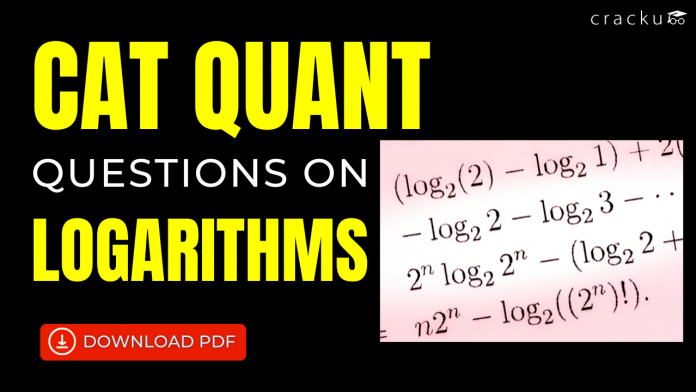CAT Logarithm Questions PDF [Most Important]
The logarithm is one of the most important topics in the CAT Quantitative Ability Section. You can check out these Logarithm questions in CAT Previous year papers. If you want to learn the basics, you can watch these videos on Logarithm basics. This article will look into some important Logarithm Questions for CAT. These are good sources for practice; If you want to practice these questions, you can download this CAT Logarithm Most Important Questions PDF below, which is completely Free.
Download Logarithm Questions for CAT
Question 1: For a real number a, if $\frac{\log_{15}{a}+\log_{32}{a}}{(\log_{15}{a})(\log_{32}{a})}=4$ then a must lie in the range
a) $2<a<3$
b) $3<a<4$
c) $4<a<5$
d) $a>5$
1) Answer (C)
Solution:
We have :$\frac{\log_{15}{a}+\log_{32}{a}}{(\log_{15}{a})(\log_{32}{a})}=4$
We get $\frac{\left(\frac{\log a}{\log\ 15}+\frac{\log a}{\log32}\right)}{\frac{\log a}{\log\ 15}\times\ \frac{\log a}{\log32}\ \ }=4$
we get $\log a\left(\log32\ +\log\ 15\right)=4\left(\log\ a\right)^2$
we get $\left(\log32\ +\log\ 15\right)=4\log a$
=$\log480=\log a^4$
=$a^4\ =480$
so we can say a is between 4 and 5 .
Question 2: If $\log_{2}[3+\log_{3} \left\{4+\log_{4}(x-1) \right\}]-2=0$ then 4x equals
2) Answer: 5
Solution:
We have :
$\log_2\left\{3+\log_3\left\{4+\log_4\left(x-1\right)\right\}\right\}=2$
we get $3+\log_3\left\{4+\log_4\left(x-1\right)\right\}=4$
we get $\log_3\left(4+\log_4\left(x-1\right)\ =\ 1\right)$
we get $4+\log_4\left(x-1\right)\ =\ 3$
$\log_4\left(x-1\right)\ =\ -1$
x-1 = 4^-1
x = $\frac{1}{4}+1=\frac{5}{4}$
4x = 5
Question 3: If $5 – \log_{10}\sqrt{1 + x} + 4 \log_{10} \sqrt{1 – x} = \log_{10} \frac{1}{\sqrt{1 – x^2}}$, then 100x equals
3) Answer: 99
Solution:
$5 – \log_{10}\sqrt{1 + x} + 4 \log_{10} \sqrt{1 – x} = \log_{10} \frac{1}{\sqrt{1 – x^2}}$
We can re-write the equation as: $5-\log_{10}\sqrt{1+x}+4\log_{10}\sqrt{1-x}=\log_{10}\left(\sqrt{1+x}\times\ \sqrt{1-x}\right)^{-1}$
$5-\log_{10}\sqrt{1+x}+4\log_{10}\sqrt{1-x}=\left(-1\right)\log_{10}\left(\sqrt{1+x}\right)+\left(-1\right)\log_{10}\left(\sqrt{1-x}\right)$
$5=-\log_{10}\sqrt{1+x}+\log_{10}\sqrt{1+x}-\log_{10}\sqrt{1-x}-4\log_{10}\sqrt{1-x}$
$5=-5\log_{10}\sqrt{1-x}$
$\sqrt{1-x}=\frac{1}{10}$
Squaring both sides: $\left(\sqrt{1-x}\right)^2=\frac{1}{100}$
$\therefore\ $ $x=1-\frac{1}{100}=\frac{99}{100}$
Hence, $100\ x\ =100\times\ \frac{99}{100}=99$
Question 4: The value of $\log_{a}({\frac{a}{b}})+\log_{b}({\frac{b}{a}})$, for $1<a\leq b$ cannot be equal to
a) 0
b) -1
c) 1
d) -0.5
4) Answer (C)
Solution:
On expanding the expression we get $1-\log_ab+1-\log_ba$
$or\ 2-\left(\log_ab+\frac{1}{\log_ba}\right)$
Now applying the property of AM>=GM, we get that $\frac{\left(\log_ab+\frac{1}{\log_ba}\right)}{2}\ge1\ or\ \left(\log_ab+\frac{1}{\log_ba}\right)\ge2$ Hence from here we can conclude that the expression will always be equal to 0 or less than 0. Hence any positive value is not possible. So 1 is not possible.
Question 5: If $\log_{a}{30}=A,\log_{a}({\frac{5}{3}})=-B$ and $\log_2{a}=\frac{1}{3}$, then $\log_3{a}$ equals
a) $\frac{2}{A+B-3}$
b) $\frac{2}{A+B}-3$
c) $\frac{A+B}{2}-3$
d) $\frac{A+B-3}{2}$
5) Answer (A)
Solution:
$\log_a30=A\ or\ \log_a5+\log_a2+\log_a3=A$………..(1)
$\log_a\left(\frac{5}{3}\right)=-B\ or\ \log_a3-\log_a5=B$………….(2)
and finally $\log_a2=3$
Substituting this in (1) we get $\log_a5+\log_a3=A-3$
Now we have two equations in two variables (1) and (2) . On solving we get
$\log_a3=\frac{\left(A+B-3\right)}{2\ }or\ \log_3a=\frac{2}{A+B-3}$
Checkout: CAT Free Practice Questions and Videos
Question 6: If $\log_{4}{5}=(\log_{4}{y})(\log_{6}{\sqrt{5}})$, then y equals
6) Answer: 36
Solution:
$\frac{\log\ 5}{2\log2}\ =\frac{\log\ y}{2\log2}\cdot\frac{\log\ 5}{2\log6}$
$\log\ 36\ =\ \log\ y;\ \therefore\ y\ =36$
Question 7: If Y is a negative number such that $2^{Y^2({\log_{3}{5})}}=5^{\log_{2}{3}}$, then Y equals to:
a) $\log_{2}(\frac{1}{5})$
b) $\log_{2}(\frac{1}{3})$
c) $-\log_{2}(\frac{1}{5})$
d) $-\log_{2}(\frac{1}{3})$
7) Answer (B)
Solution:
$2^{Y^2({\log_{3}{5})}}=5^{Y^2(\log_3 2)}$
Given, $5^{Y^2\left(\log_32\right)}=5^{\left(\log_23\right)}$
=> $Y^2\left(\log_32\right)=\left(\log_23\right)=>Y^2=\left(\log_23\right)^2$
=>$Y=\left(-\log_23\right)^{\ }or\ \left(\log_23\right)$
since Y is a negative number, Y=$\left(-\log_23\right)=\left(\log_2\frac{1}{3}\right)$
Question 8: Let x and y be positive real numbers such that
$\log_{5}{(x + y)} + \log_{5}{(x – y)} = 3,$ and $\log_{2}{y} – \log_{2}{x} = 1 – \log_{2}{3}$. Then $xy$ equals
a) 150
b) 25
c) 100
d) 250
8) Answer (A)
Solution:
We have, $\log_{5}{(x + y)} + \log_{5}{(x – y)} = 3$
=> $x^2-y^2=125$……(1)
$\log_{2}{y} – \log_{2}{x} = 1 – \log_{2}{3}$
=>$\ \frac{\ y}{x}$ = $\ \frac{\ 2}{3}$
=> 2x=3y => x=$\ \frac{\ 3y}{2}$
On substituting the value of x in 1, we get
$\ \frac{\ 5x^2}{4}$=125
=>y=10, x=15
Hence xy=150
Question 9: If p$^{3}$ = q$^{4}$ = r$^{5}$ = s$^{6}$, then the value of $log_{s}{(pqr)}$ is equal to
a) $\frac{47}{10}$
b) $\frac{24}{5}$
c) $\frac{16}{5}$
d) $1$
9) Answer (A)
Solution:
Given that, p$^{3}$ = q$^{4}$ = r$^{5}$ = s$^{6}$
p$^{3}$=s$^{6}$
p = s$^{\frac{6}{3}}$ = s$^{2}$ …(1)
Similarly, q = s$^{\frac{6}{4}}$ = s$^{\frac{3}{2}}$ …(2)
Similarly, r = s$^{\frac{6}{5}}$ …(3)
$\Rightarrow$ $log_{s}{(pqr)}$
By substituting value of p, q, and r from equation (1), (2) and (3)
$\Rightarrow$ $log_{s}{(s^{2}*s^{\frac{3}{2}}*s^{\frac{6}{5}})}$
$\Rightarrow$ $log_{s}(s^{\frac{47}{10}})$
$\Rightarrow$ $\dfrac{47}{10}$
Hence, option A is the correct answer.
Question 10: $\frac{1}{log_{2}100}-\frac{1}{log_{4}100}+\frac{1}{log_{5}100}-\frac{1}{log_{10}100}+\frac{1}{log_{20}100}-\frac{1}{log_{25}100}+\frac{1}{log_{50}100}$=?
a) $\frac{1}{2}$
b) 10
c) 0
d) −4
10) Answer (A)
Solution:
We know that $\dfrac{1}{log_{a}{b}}$ = $\dfrac{log_{x}{a}}{log_{x}{b}}$
Therefore, we can say that $\dfrac{1}{log_{2}{100}}$ = $\dfrac{log_{10}{2}}{log_{10}{100}}$
$\Rightarrow$ $\frac{1}{log_{2}100}-\frac{1}{log_{4}100}+\frac{1}{log_{5}100}-\frac{1}{log_{10}100}+\frac{1}{log_{20}100}-\frac{1}{log_{25}100}+\frac{1}{log_{50}100}$
$\Rightarrow$ $\dfrac{log_{10}{2}}{log_{10}{100}}$-$\dfrac{log_{10}{4}}{log_{10}{100}}$+$\dfrac{log_{10}{5}}{log_{10}{100}}$-$\dfrac{log_{10}{10}}{log_{10}{100}}$+$\dfrac{log_{10}{20}}{log_{10}{100}}$-$\dfrac{log_{10}{25}}{log_{10}{100}}$+$\dfrac{log_{10}{50}}{log_{10}{100}}$
We know that $log_{10}{100}=2$
$\Rightarrow$ $\dfrac{1}{2}*[log_{10}{2}-log_{10}{4}+log_{10}{5}-log_{10}{10}+log_{10}{20}-log_{10}{25}+log_{10}{50}]$
$\Rightarrow$ $\dfrac{1}{2}*[log_{10}{\dfrac{2*5*20*50}{4*10*25}}]$
$\Rightarrow$ $\dfrac{1}{2}*[log_{10}10]$
$\Rightarrow$ $\dfrac{1}{2}$




![CAT Averages Questions PDF [Important Questions] CAT AVERAGES Questions PDF](https://cracku.in/blog/wp-content/uploads/2022/07/CAT-AVERAGES-Questions-PDF-218x150.png)
